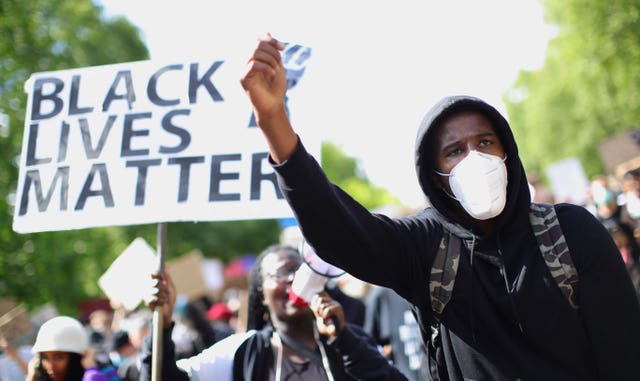Britain is no longer a country where the “system is deliberately rigged against ethnic minorities”, a landmark review commissioned in the wake of the Black Lives Matter movement has argued.
The Commission on Race and Ethnic Disparities said geography, family influence, socio-economic background, culture and religion all impact life chances more than racism.
It has criticised the “confusing” way the term “institutional racism” has been applied, saying this should only be used when deep-seated, systemic racism is proved and not as a “catch-all” phrase for any microaggression.
Labour said the report was a “divisive polemic” which has insulted people by downplaying institutional racism, while the unions said the report was “deeply cynical” and denied the experiences of black and minority ethnic workers.
He said the review found some evidence of bias, but often it was a perception that the wider society could not be trusted.
Dr Sewell wrote: “Put simply, we no longer see a Britain where the system is deliberately rigged against ethnic minorities.
“The impediments and disparities do exist, they are varied, and ironically very few of them are directly to do with racism.
“Too often ‘racism’ is the catch-all explanation, and can be simply implicitly accepted rather than explicitly examined.
“The evidence shows that geography, family influence, socio-economic background, culture and religion have more significant impact on life chances than the existence of racism.
“That said, we take the reality of racism seriously and we do not deny that it is a real force in the UK.”
Shadow women and equalities secretary Marsha de Cordova said: “To downplay institutional racism in a pandemic where black, Asian and ethnic minority people have died disproportionately and are now twice as likely to be unemployed is an insult.”

Deputy chief executive of NHS Providers Saffron Cordery said: “While some progress has been made, to pretend that discrimination does not exist is damaging, as is denying the link between structural racism and wider health inequalities.”
She said change requires an “honest conversation”, adding: “Concrete action is needed to tackle structural racism, bias and discrimination in the health service, across other public services and across society.”
The Institute of Race Relations said the report’s findings and recommendations “fit neatly with the Government’s attempts, post-Brexit, to portray the British nation as a beacon of good race relations” and a model for countries across the globe.
The report said there is an “increasingly strident form of anti-racism thinking that seeks to explain all minority disadvantage through the prism of white discrimination”.
This, it says, diverts attention from other reasons for disparities of outcome.
The report notes that the Black Lives Matter protests last year saw many young people in Britain calling for change.
It says that, while it understands the “idealism” of these “well-intentioned” young people, it questions whether a narrative claiming that nothing has improved “will achieve anything beyond alienating the decent centre ground”.

It follows wider discussions around racism following the death of George Floyd in the US last year, subsequent Black Lives Matter protests, elite sports stars taking the knee before football matches, and a claim by the Duke and Duchess of Sussex in an explosive interview with Oprah Winfrey that a member of the royal family – not the Queen or the Duke of Edinburgh – made a racist comment about their son Archie.
In response, Prime Minister Boris Johnson said the Government will consider the recommendations, adding: “The entirety of government remains fully committed to building a fairer Britain and taking the action needed to address disparities wherever they exist.“
While acknowledging that overt racism still exists, the commission says there is much evidence to suggest different experiences of family life can explain many disparities in education outcomes and crime.
It also heralds a new “era of participation”, but said this can only be achieved with the acknowledgement that the UK has undergone a fundamental shift to become a “more open society”.
The report notes improvements such as increasing diversity in elite profession, a shrinking ethnicity pay gap and that children from many ethnic communities do as well or better than white pupils in compulsory education.
But it said there are “overly pessimistic narratives” and said too much public debate is “ill-informed”.
It said police-recorded hate crime figures are rising because of improvements in the recording process and greater awareness, rather than the problem worsening.
It concludes that progress is not achieved by “cleaving to a fatalistic account that insists nothing has changed”, adding: “It is closer contact, mutual understanding across ethnic groups and a shared commitment to equal opportunities that has contributed to the progress we have made.”
The 264-page report makes 24 recommendations, which the commission says have “tried to account for the messy reality of life” and are aimed at all disadvantaged people.
These include calls for increased scrutiny of body-worn police footage of stop and searches, more detailed, publicly available data, more local recruitment within police forces, and improved training to help officers interact with the communities they serve.
A pilot should be developed in four police areas where young people with low level possession of class B drugs should helped by public health services and diverted away from the criminal justice system, it recommends.
It also calls for an Office for Health Disparities to be established to tackle health inequalities, and for a review on action to address the underlying issues facing families.






